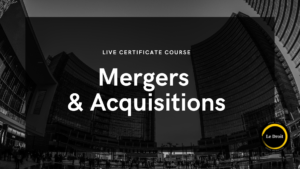Original price was: ₹6,000.00.₹4,000.00Current price is: ₹4,000.00.
The Contracts Expert Combo-Contract Drafting, Life-Cycle Management & Freelancing
Course CombosLive CoursesSelf-PacedDescription
This combo is suitable for all those looking forward to get hands-on experience in Contracts Drafting, learning how companies manage Contract Lifecycles, getting an international perspective on their contract drafting skills and finally, monetizing these skills to earn through freelancing!
The Combo includes the following skill courses:
1. Contract Drafting (Live Course)- Starting 28th July, 2025
2. Contract Lifecycle Management (Live Course)- Starting 19th July, 2025
3. Freelancing for Lawyers (Live Course)- Starting 10th August, 2025
Class timings:
Contract Drafting: 8:30 to 9:30 pm
Contract Lifecycle Management: 8:30 to 9:30 pm (Weekend sessions only)
Freelancing for lawyers: 7:30 to 8:30 pm
Course Duration:
Contract Drafting: 15 Sessions
CLM: 7 Sessions
Freelancing for lawyers: 10 Days
This combo includes practical drafting techniques, exercises, client approaching techniques, and a lot more!
MODULE 1:
What are Contracts?
Types of Contracts:-On the basis of its enforcement
On the basis of mode of creation
On the basis of extent of execution
E-Contracts and its validity.
MODULE 2:
Standard Form of Contracts
Importance of Standard form of contracts
Types of Standard form of Contracts
MODULE 3:
Registration of Contracts
Contracts which require registration
Contract’s which don’t require registration
Stamping
Attestation & Notarization
MODULE 4:
Breach of Contract
Common Breaches
Damages
Types of Damages
Remedies for breach of contract
MODULE 5:
Drafting of a contract:-
Operating Clause
Boilerplate Clauses
Risk mitigation clauses
MODULE 6: Drafting of Contracts and Documents:
Master Service Agreement
Service Agreement
Incentive Contracts& Time and Material Contracts
Labour-Hour contracts
Indefinite-Delivery Contracts
Employee Contracts
Non-Disclosure Agreements
Memorandum of Understanding
MODULE 7:
Understanding Contract Life Cycle Management
What is CLM?
Definition and the role it plays in businesses.
Why managing contracts effectively is essential.
Types of Contracts
Commercial contracts, vendor agreements, employment contracts, etc.
Key Stakeholders in CLM
Roles of legal teams, procurement, and business units in managing contracts.
MODULE 8:
Stages of the Contract Life Cycle
Contract Request: Identifying the need for a contract.
Drafting: Creating the contract with standard terms.
Negotiation: Revising terms until both parties agree.
Approval: Internal review and authorization.
Execution: Signing the contract.
Performance: Monitoring compliance and obligations.
Amendments: Modifying the contract if needed.
Renewal/Termination: Deciding to renew or end the contract.
MODULE 9: Why CLM is Important
Efficiency and Cost Savings
How effective CLM saves time and reduces risks.
Ensuring Compliance
How CLM ensures adherence to laws and internal policies.
Risk Mitigation
Identifying and addressing potential risks during the contract life cycle.
MODULE 10: Best Practices in CLM
Centralizing Contracts
Importance of organizing contracts in a structured way.
Clear Communication
Ensuring clear communication between all parties throughout the contract life cycle.
Timely Reviews and Renewals
Tips for setting reminders and staying ahead of contract deadlines.
MODULE 11: Challenges and Solutions in CLM
Common Challenges for Beginners
Lack of awareness of contract deadlines.
Misunderstanding contract terms.
Difficulty managing multiple contracts.
Simple Solutions
Setting up regular reviews.
Communicating regularly with stakeholders to avoid missed deadlines.
Keeping contracts accessible and organized.
MODULE 12: Real-Life Examples of CLM
Case Study 1: Contract Renewal Management
Example of a company successfully managing contract renewals without delays.
Case Study 2: Contract Amendments
Real-life situation where effective amendment management saved a project.
Case Study 3: Ensuring Compliance
How a company used clear processes to stay compliant with contract obligations.
Practical Learning Activities
Contract Drafting Practice
Learners will draft a basic contract with key terms.
Contract Review Exercise
A sample contract will be provided, and learners will review it for any issues.
Scenario-Based Discussion
Learners will discuss how to handle specific situations, such as contract renewal or dealing with a breach of contract.
Freelancing for Lawyers: (Syllabus)
Module 1: Introduction to Freelancing
- Understanding Freelancing: Overview of freelancing, including the different types of freelance work available across industries.
- Pros and Cons of Freelancing: Benefits and challenges of freelancing compared to traditional employment.
- Freelancing vs. Traditional Employment: Key differences and factors to consider when transitioning to freelancing.
Module 2: Setting Up Your Freelance Business
- Legal and Administrative Setup: Understanding the legal requirements, choosing a business structure, and registering your freelance business.
- Tools and Technology: Essential tools and software for managing your freelance business, including project management, communication, and accounting tools.
- Creating a Workspace: Setting up a productive workspace, whether at home or in a co-working space.
Module 3: Identifying Your Niche and Services
- Finding Your Niche: How to identify your area of expertise and target market within your industry.
- Service Offerings: Determining the types of services you can offer as a freelancer, from consulting to project-based work.
- Pricing Strategies: Developing pricing strategies that reflect your expertise, market demand, and financial goals.
Module 4: Building Your Brand and Online Presence
- Personal Branding: Developing a strong personal brand that resonates with your target audience.
- Utilizing Freelancing Platforms:How to use various Freelancing platforms such as Upwork , Fiverr , Freelancer, PeoplePerHour, Guru etc..
- Leveraging Social Media: Using social media platforms like LinkedIn, Instagram, and Twitter to promote your services and connect with potential clients.
- Content Marketing: Creating valuable content, such as blogs, videos, and newsletters, to attract and engage clients.
Module 5: Marketing Your Freelance Services
- Networking and Referrals: Building and leveraging a professional network to generate leads and referrals.
- Pitching and Proposal Writing: Crafting effective pitches and proposals that win clients.
- Building a Client Base: Strategies for attracting and retaining clients, including offering exceptional customer service.
Module 6: Managing Clients and Projects
- Client Onboarding: Creating a seamless process for onboarding new clients, including contracts and agreements.
- Effective Communication: Best practices for communicating with clients to build strong relationships and ensure project success.
- Time Management: Techniques for managing your time effectively, juggling multiple projects, and avoiding burnout.
- Handling Difficult Clients: Strategies for managing challenging client situations and maintaining professionalism.
Module 7: Financial Management for Freelancers
- Budgeting and Financial Planning: Creating a budget, setting financial goals, and managing cash flow.
- Invoicing and Payments: Best practices for invoicing clients, setting payment terms, and handling late payments.
- Taxes and Deductions: Understanding your tax obligations as a freelancer, including deductions, filing requirements, and working with an accountant.
- Building Financial Stability: Tips for saving, investing, and planning for retirement as a freelancer.
Module 8: Scaling Your Freelance Business
- Expanding Your Services: Exploring ways to diversify your services and increase your income.
- Outsourcing and Collaboration: When and how to outsource work or collaborate with other freelancers to grow your business.
- Automating and Streamlining: Using automation tools to streamline your workflow and increase efficiency.
- Long-Term Planning: Setting long-term goals for your freelance business, whether it’s scaling, transitioning to an agency, or maintaining a sustainable solo practice.
Module 9: Freelancing in the Digital Age
- Remote Work Best Practices: Tips for working remotely, including managing time zones, staying productive, and maintaining work-life balance.
- Leveraging Technology: Staying ahead of trends and using emerging technologies to enhance your freelance work.
- Global Freelancing: Understanding the opportunities and challenges of freelancing in a global market, including cultural considerations and international clients.
Module 10: Real-Life Success Stories and Case Studies
- Learning from the Best: Interviews and case studies of successful freelancers from various industries, sharing their journeys and tips for success.
- Common Mistakes to Avoid: Insights into common pitfalls and how to avoid them in your freelancing career.
- Practical Exercises: Real-world scenarios and exercises to help you apply what you’ve learned in the course.
- Creating Your Action Plan: Guiding participants through the process of creating a personalized action plan for starting or growing their freelance business.
- Additional Resources: Providing access to templates, checklists, and other resources to support your freelancing journey.




